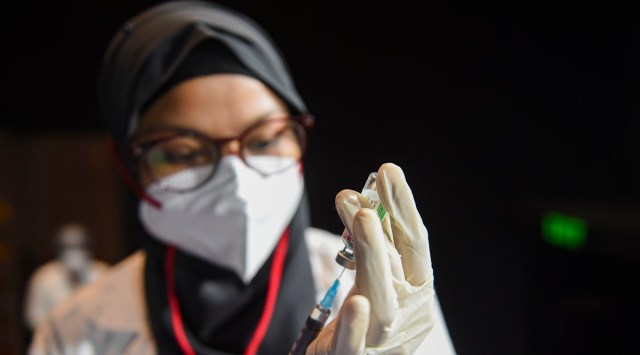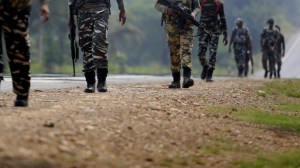Gujarat-based Zydus Cadila’s three-dose Covid-19 vaccine was on Friday granted emergency use authorisation for use in adults and children above 12 years, making it potentially the first vaccine to be administered to the adolescent population in India.
With the central drug regulator clearing the vaccine, Zydus Cadila’s ZyCoV-D is set to become the first Covid vaccine candidate developed on a plasmid DNA platform to be commercially introduced anywhere in the world.

The vaccine, jointly developed in partnership with the Department of Biotechnology, had demonstrated a primary efficacy of 66.66 per cent in phase 3 clinical trials. It was the first Covid-19 vaccine in India to be tested in the adolescent population — those in the 12-18-year age group.
On Friday, the Indian drug regulator said in a tweet that after evaluating the “interim” phase III clinical trials results in consultation with the subject expert committee, it has approved ZyCoV-D “for restricted use in emergency situation in India for 12 years and above”. The vaccine is to be administered at days 0, 28, and, 56, the regulator said.
While the vaccine has been approved for use in the adolescent population, it’s for the government to take a call on whether to roll out the vaccination drive for this age group.
ExplainedLow-cost, no cold storage
ZyCoV-D is the world's first Covid-19 vaccine built on a DNA platform to be granted emergency use authorisation. Unlike mRNA vaccines, DNA-based vaccines do not require ultra-cold storage systems and are said to be more cost-effective. Zydus also claims that its technology is ideal for tackling Covid-19 as it can be easily adapted to deal with mutations in the virus.
So far, there are three vaccines that are being used in India’s immunisation drive — SII’s Covishield, Bharat Biotech’s Covaxin and Russia’s Sputnik V. Moderna’s mRNA vaccine and the single-dose vaccine developed by Johnson & Johnson have also received EUA, but they are not being used in the vaccination drive yet.
Top government sources said the Zydus DNA Covid-19 vaccine is likely to arrive in the market by October. In July, Zydus had said that it plans to manufacture 10-12 crore doses annually.
Story continues below this ad
ZyCoV-D, which uses the ‘plug and play’ technology, has a DNA plasmid vector that carries the gene encoding the spike protein present on the surface of SARS-CoV-2, which causes the Covid-19 infection. When the DNA plasmid is injected into the human cell, it enters the nucleus and reproduces spike proteins. In response, the human body generates antibodies.
Zydus also claims that its technology is “ideally” suited for tackling Covid-19 as it can be easily adapted to deal with mutations in the virus, such as those already occurring. Friday’s approval comes on the basis of data generated from the largest clinical trial for a Covid-19 vaccine in India, with over 28,000 participating in phase-III of clinical trials.
The DNA vaccine platform has, broadly, three advantages. First, it is an intradermal vaccine, which is applied using the needle-free system, resulting in a reduction in side-effects such as pain at the injection site.
Second, unlike m-RNA vaccines, which need ultra-cold storage systems, the DNA vaccines can be stored at 2-8 degrees Celsius that is best suited for India’s cold storage requirement.
Story continues below this ad
Third, the vaccine manufacturing facility does not require the setting up of BSL-3 high containment facility as is required in the production of inactivated virus vaccines like Covaxin. Instead, the vaccine can be manufactured with minimum biosafety requirements.
“Double good news for the nation!@CDSCO_INDIA_INF approves the 1st DNA-based, needle-free #COVID19 vaccine in the world – ‘ZyCov-D’… Making children of India COVID-safe, this vaccine can be used for individuals aged 12 and above. ZyCov-D is the 6th approved #COVID19 vaccine in India, and the 2nd indigenously developed one. PM @NarendraModi Ji’s vision of #AatmanirbharBharat and Make in India delivers another significant accomplishment!,” Mandaviya said in a tweet.
“We are extremely happy that our efforts to put out a safe, well-tolerated, and efficacious vaccine to fight COVID-19 has become a reality with ZyCoV-D. To create the world’s first DNA vaccine at such a crucial juncture and despite all the challenges, is a tribute to the Indian research scientists and their spirit of innovation. I’d like to thank the Department of Biotechnology, Government of India for their support in this mission of Atma Nirbhar Bharat and Indian Vaccine Mission COVID Suraksha,” said Pankaj R Patel, Chairman of the Zydus Group.
On July 1, announcing the interim results of phase III clinical trials, Zydus, had said that a primary efficacy of 66.6 per cent has been attained for symptomatic RT-PCR positive cases in the interim analysis.
Story continues below this ad
The vaccine was developed in partnership with the Department of Biotechnology under the ‘Mission COVID Suraksha’ and implemented by the Biotechnology Industry Research Assistance Council.
“It is a matter of great pride that today we have the EUA for the world’s first DNA COVID-19 vaccine, ZyCoV-D, by Zydus, developed in partnership with the Department of Biotechnology and supported through Mission COVID Suraksha,” said Dr Renu Swarup, Secretary, DBT and Chairperson, BIRAC.
In 2010, Zydus became the first company to develop and indigenously manufacture a vaccine against swine flu. The company earlier developed the tetravalent seasonal influenza vaccine and the inactivated rabies vaccine.
According to Health Ministry data, India has administered 57.22 crore doses so far, of which 44.44 crore have received their first dose, and 12.77 crore have received both their doses.









